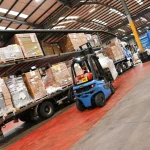
Compliance, Simplified: 17-Step Guide to Navigating Export Standards from Kenya with Wooden Pallet Precision
Introduction: Kenya’s Rising Role in Global Trade
Kenya is rapidly cementing its place as a key export hub in Africa, with major shipments of tea, coffee, horticulture, and textiles reaching the U.S., EU, UAE, and China. With the African Continental Free Trade Area (AfCFTA) and other global opportunities, exporters have never had more potential.
Yet, to thrive globally, Kenyan exporters must prioritize compliance. From phytosanitary standards to pallet regulations, even minor mistakes can result in rejected shipments, fines, or loss of market access.
This guide will walk you through everything you need to navigate export compliance from Kenya confidently and precisely—including the often-overlooked importance of using new, ISPM-15 certified wooden pallets.
Understanding Export Regulations from Kenya
National Bodies Overseeing Compliance
Kenya has a well-defined export control system led by:
- Kenya Bureau of Standards (KEBS) – Ensures product quality meets destination country standards.
- Kenya Revenue Authority (KRA) – Regulates customs clearance and tax compliance.
- Horticultural Crops Directorate (HCD) and PCPB – Handle regulations for agricultural produce and chemicals.
Exporters must also comply with regional obligations under the East African Community (EAC), and global frameworks through WTO participation.
Key Export Documentation in Kenya
To export successfully, the following documents are commonly required:
| Document | Purpose |
|---|---|
| Certificate of Origin | Verifies product origin for duty exemptions |
| Export Permit | Required for regulated products (e.g., coffee, flowers) |
| Phytosanitary Certificate | For agricultural and horticultural items |
| ECTS (Electronic Cargo Tracking System) | Secures goods in transit |
| KEBS Inspection Report | Verifies compliance with target country quality standards |
Export Licenses and Special Requirements
Certain Kenyan exports need special licensing:
- Coffee, tea, and horticulture require registration with respective directorates.
- Medicines, chemicals, and electronics may fall under restricted categories needing approval.
- Exporters to the EU or U.S. (under AGOA) may need additional traceability documents.
Always check with TradeMark Africa, KRA, and Export Promotion Council for updates.
Classifying Goods and Identifying Controlled Items
Using the right HS (Harmonized System) code is essential for:
- Determining tariff rates
- Identifying need for licenses
- Ensuring customs clearance
Incorrect classification can cause serious delays and fines.
The Role of Wooden Pallets in Export Compliance and Logistics
Why Pallets Matter
International buyers increasingly demand that Kenyan goods be shipped using new, heat-treated wooden pallets that meet ISPM-15 standards—a phytosanitary measure that prevents the spread of pests via wood packaging.
Benefits of New Wooden Pallets:
- Compliance with global import regulations (especially in EU, U.S., Australia)
- Improved hygiene and product safety—critical for food and flowers
- Reduced rejections at port due to pest-infested or uncertified pallets
- Durability for longer transit routes
Exporters using recycled or untreated pallets risk shipment seizure or rejection. Investing in quality, ISPM-15 certified pallets not only ensures compliance but enhances brand reputation.
Sanctions, Embargoes, and Global Market Access for Kenyan Exporters
While Kenya enjoys open market access to many countries, exporters must avoid dealing with:
- Sanctioned nations or companies (Iran, North Korea, Russia, etc.)
- Buyers on restricted lists from the U.S. Office of Foreign Assets Control (OFAC)
Always screen new clients or partners through compliance databases.
Continuing the Kenya-focused export compliance guide…
The Impact of Trade Agreements on Kenyan Exports
Kenya benefits from several powerful trade agreements that lower tariffs and simplify access to global markets:
Key Trade Agreements:
- AGOA (African Growth and Opportunity Act) – Provides duty-free access to the U.S. for eligible Kenyan products.
- EAC (East African Community) – Eases regional trade among East African nations.
- COMESA – Offers preferential treatment within a 21-country regional bloc.
- UK-Kenya EPA – Allows continued duty-free exports to the UK post-Brexit.
Exporters must provide proper certificates of origin to enjoy these benefits. Failure to comply may lead to retroactive duties or loss of market privileges.
Building a Robust Export Compliance Program in Kenya
Whether you’re a flower exporter in Naivasha or a textile company in Nairobi, having a formal compliance program can be a game-changer.
Components of a Strong Export Compliance Program:
- Leadership commitment – Management must champion compliance.
- Policy documentation – Clear procedures for all export activities.
- Staff training – On documentation, pallets, licenses, and market requirements.
- Risk assessments – Regular reviews to identify and resolve gaps.
- Internal audits – Track export practices against regulations.
Even small and medium enterprises (SMEs) can benefit by streamlining operations and reducing shipment rejections.
Recordkeeping and Audit Readiness for Kenyan Exporters
Kenya Revenue Authority (KRA) and customs authorities require exporters to maintain accurate export records for at least five years.
Essential Records Include:
- Invoices and shipping bills
- KEBS inspection reports
- Pallet treatment certificates (ISPM-15)
- Export permits and certificates of origin
Keeping digital copies and physical backups is highly recommended. Being audit-ready builds credibility and helps in speedy issue resolution during customs checks.
Technology Transfers and Deemed Exports from Kenya
Kenyan tech startups and educational institutions exporting software, research, or expertise must understand deemed export rules.
Examples of deemed exports:
- Sharing code or designs with foreign developers
- Online training or webinars involving restricted tech
- Emailing proprietary data to offshore partners
Always check if the intellectual property or data falls under any control lists, and whether recipients require prior clearance.
The Role of Trade Facilitation and Automation
Kenya’s government has invested heavily in digital systems to ease exports.
Key Platforms:
- Kenya TradeNet System – A one-stop platform for document submissions and customs clearance.
- Simba System (KRA) – Used for tracking shipments and tax obligations.
- ePortal by KEBS – Allows exporters to schedule inspections and submit certificates.
Exporters can also explore private automation tools for invoice generation, HS code matching, and tracking pallet certification records.
Navigating Export Challenges in Kenya
Despite the progress, exporters still face some challenges:
- Infrastructure bottlenecks – Delays at Mombasa port and weighbridge congestion
- Corruption and informal fees – Particularly at borders
- Fluctuating freight rates and container shortages
Mitigation Tips:
- Partner with compliance-trained freight forwarders
- Use certified wooden pallets to reduce inspection time
- Join exporter associations like KEPROBA for support and updates
Sector-Specific Export Compliance in Kenya
Horticulture & Agriculture
- Must meet EU’s strict phytosanitary requirements
- Certified wooden pallets required for flowers and fresh produce
Textiles & Apparel
- AGOA beneficiaries must prove yarn origin and labor standards
- ISPM-15 compliance for packaging when exporting to the U.S.
Handicrafts & Wood Products
- Must prove legal sourcing of wood under international sustainability laws
- Heat treatment certificates for pallets and packaging
Common Mistakes Kenyan Exporters Make
- Using old or non-ISPM-15 pallets – Causes port rejections in EU, U.S., and China
- Incorrect product classification – Leads to wrong tariffs or seizure
- Skipping partner screening – Risk of trading with sanctioned entities
- Under-declaring values – Triggers investigations and heavy penalties
- Ignoring renewal of export permits
Real-World Example:
A flower exporter in Eldoret lost a major Dutch client after repeated deliveries arrived using untreated wooden pallets. Lesson: Compliance is about both legal and logistical standards.
The Future of Export Compliance in Kenya
As Kenya modernizes its trade systems, exporters must stay agile and informed.
Trends to Watch:
- Paperless trade corridors across East Africa
- Green logistics and sustainability-linked compliance
- Digital certificates of origin
- AI-driven trade analytics for risk detection
Kenya’s exporters who embrace tech, compliance automation, and quality assurance (like new certified pallets) will thrive in global markets.
FAQs for Kenyan Exporters
1. What are the key bodies overseeing export compliance in Kenya?
KEBS, KRA, PCPB, and HCD are primary regulators depending on your product type.
2. Are wooden pallets mandatory for exports?
Yes, most countries require ISPM-15 certified new wooden pallets, especially for fresh produce and food exports.
3. How do I get a certificate of origin?
Through the Kenya National Chamber of Commerce or Export Promotion Council.
4. What happens if I use untreated or recycled pallets?
Your goods may be quarantined or rejected at the receiving port due to pest contamination risks.
5. Can I export software or online services from Kenya?
Yes, but some exports may be deemed sensitive and require screening or compliance with data transfer laws.
6. How do I know if my buyer is restricted?
Use export compliance software or manually check global restricted party lists like OFAC, EU, and UN.
Conclusion: Exporting from Kenya with Confidence and Precision
Kenya’s exporters have a golden opportunity to expand globally—if they can master compliance. From getting the right permits and documents to using certified wooden pallets, every step matters.
With the right knowledge, tools, and partnerships, you can simplify compliance, avoid costly mistakes, and earn global trust. Stay informed, train your team, invest in quality logistics, and export with confidence and precision.





Add a comment